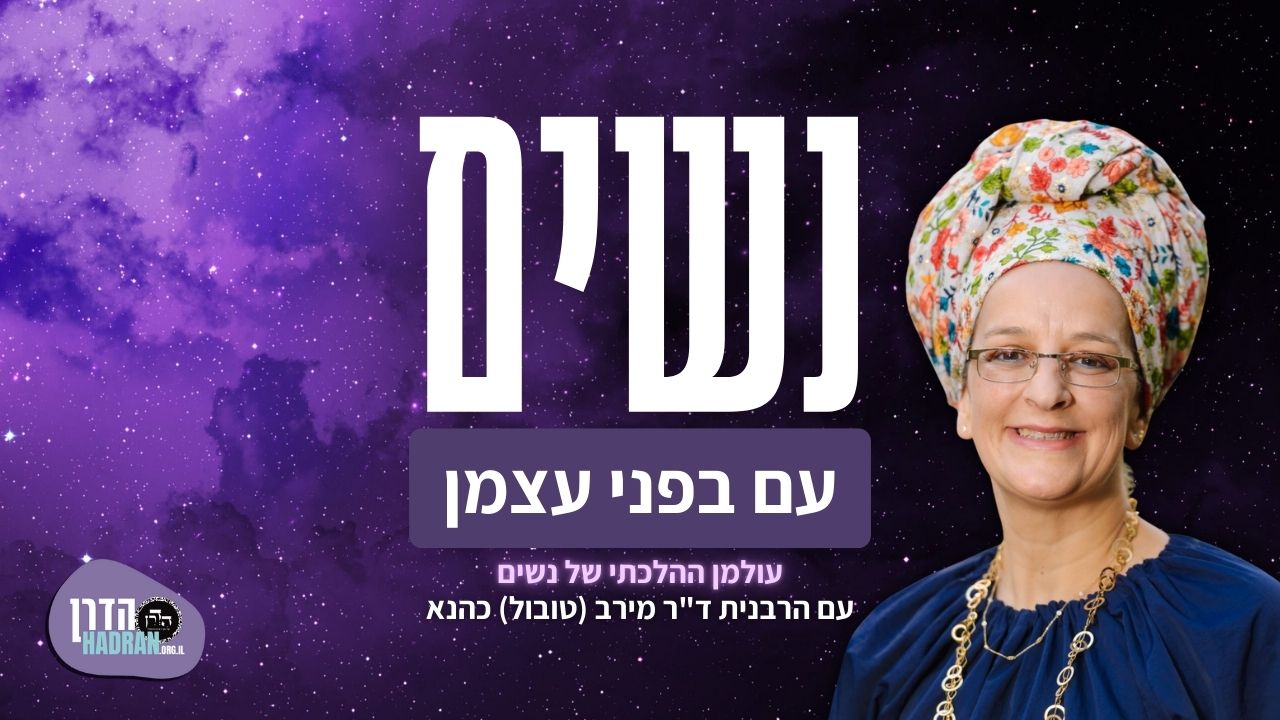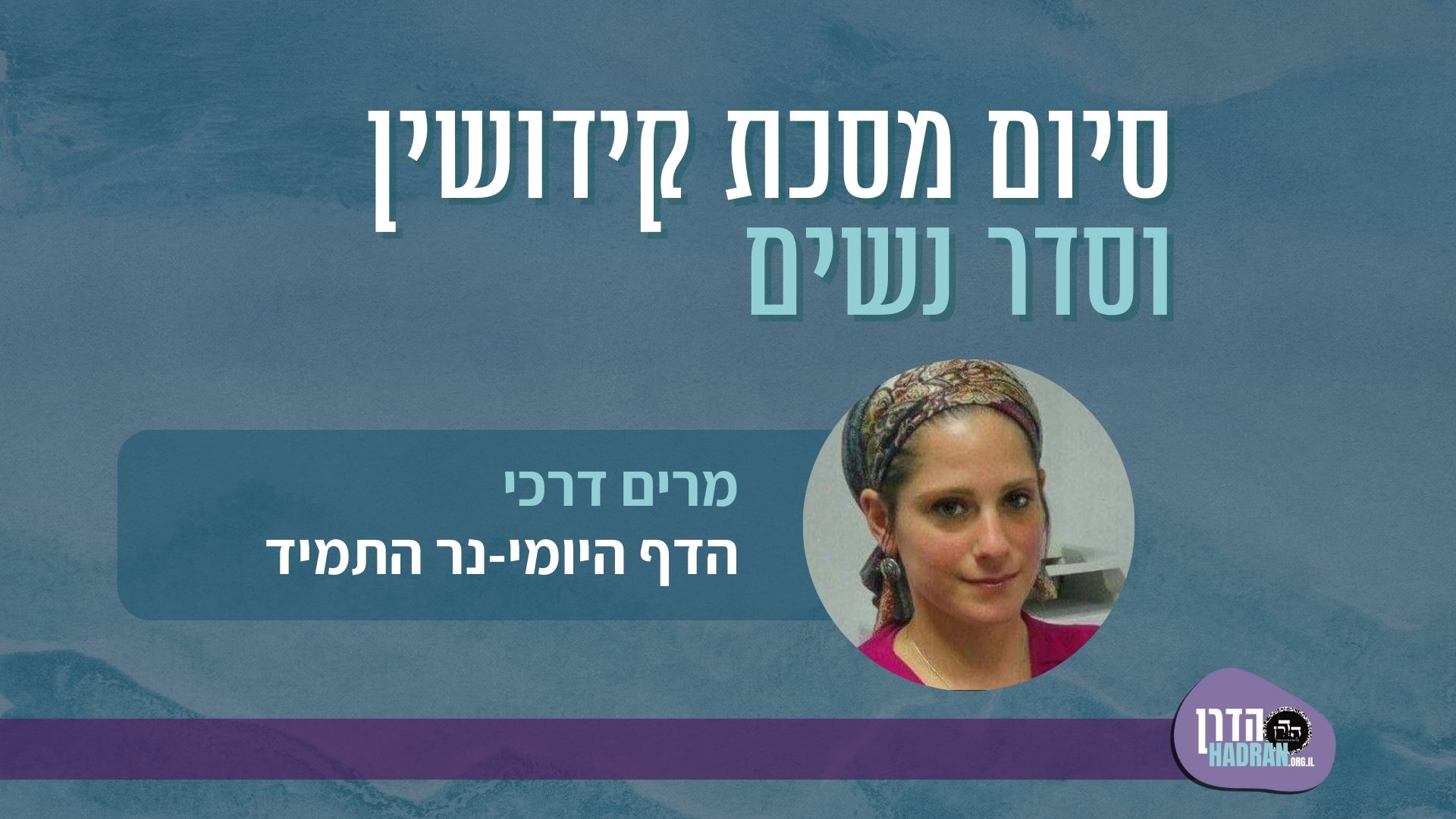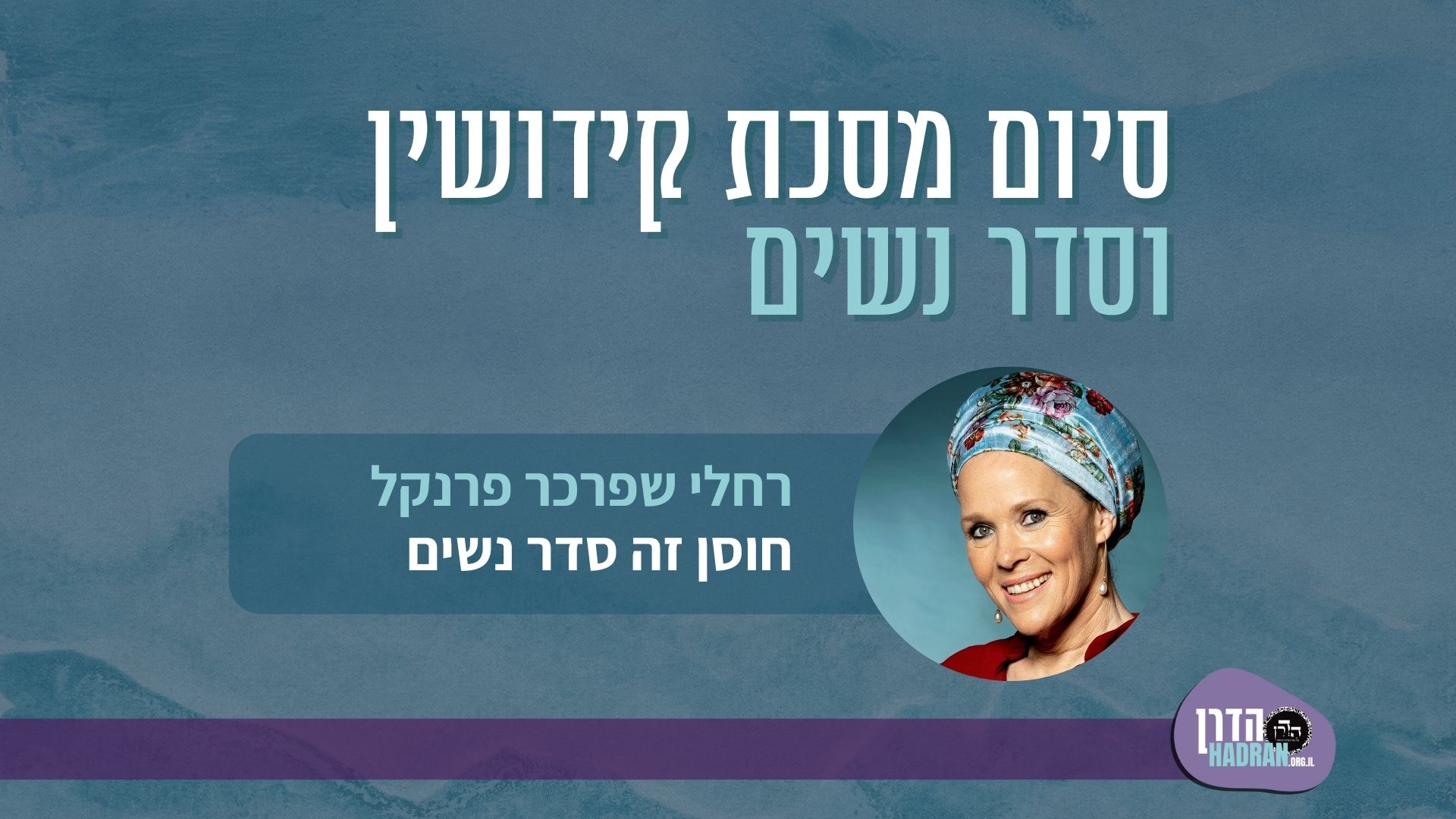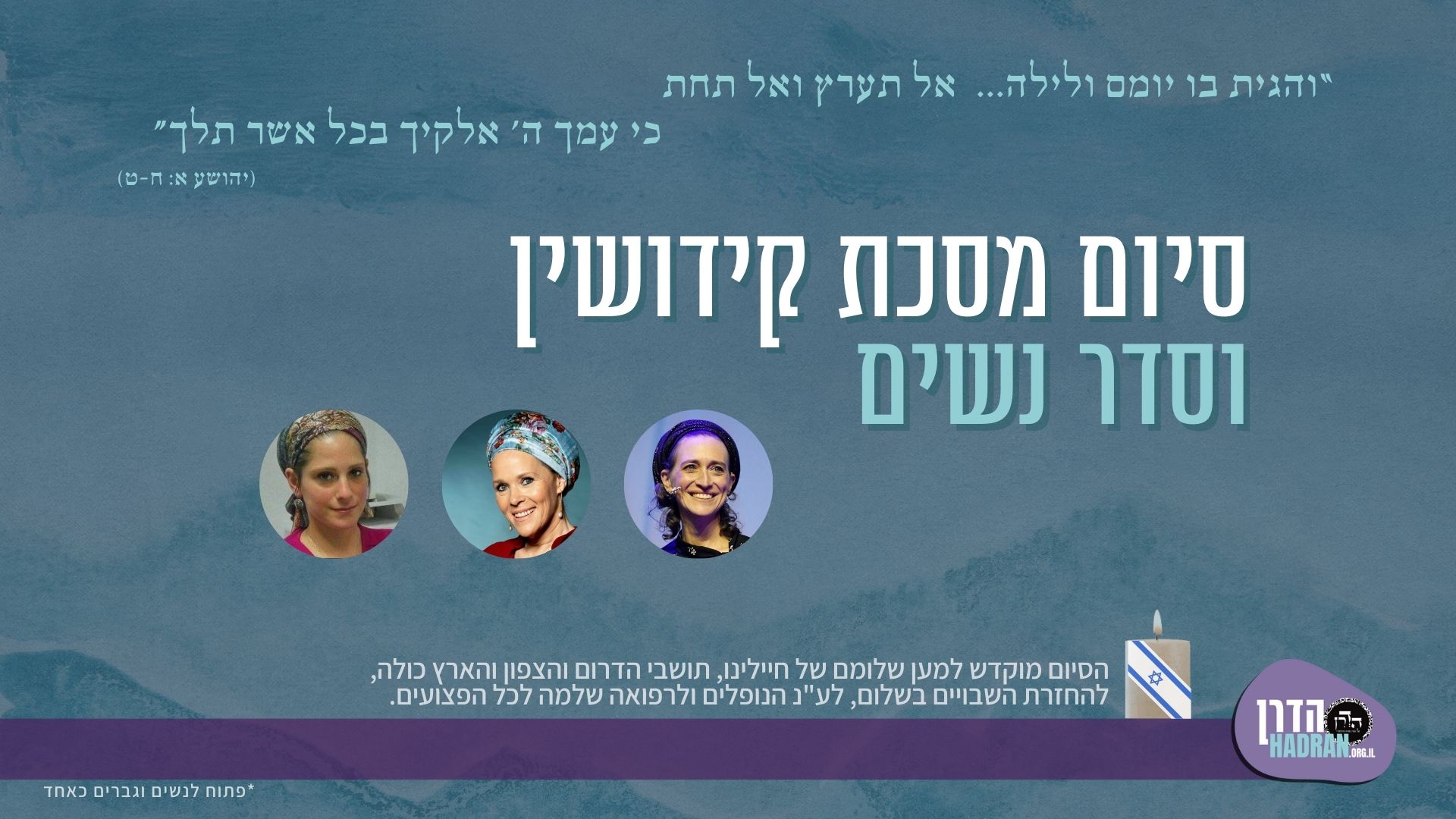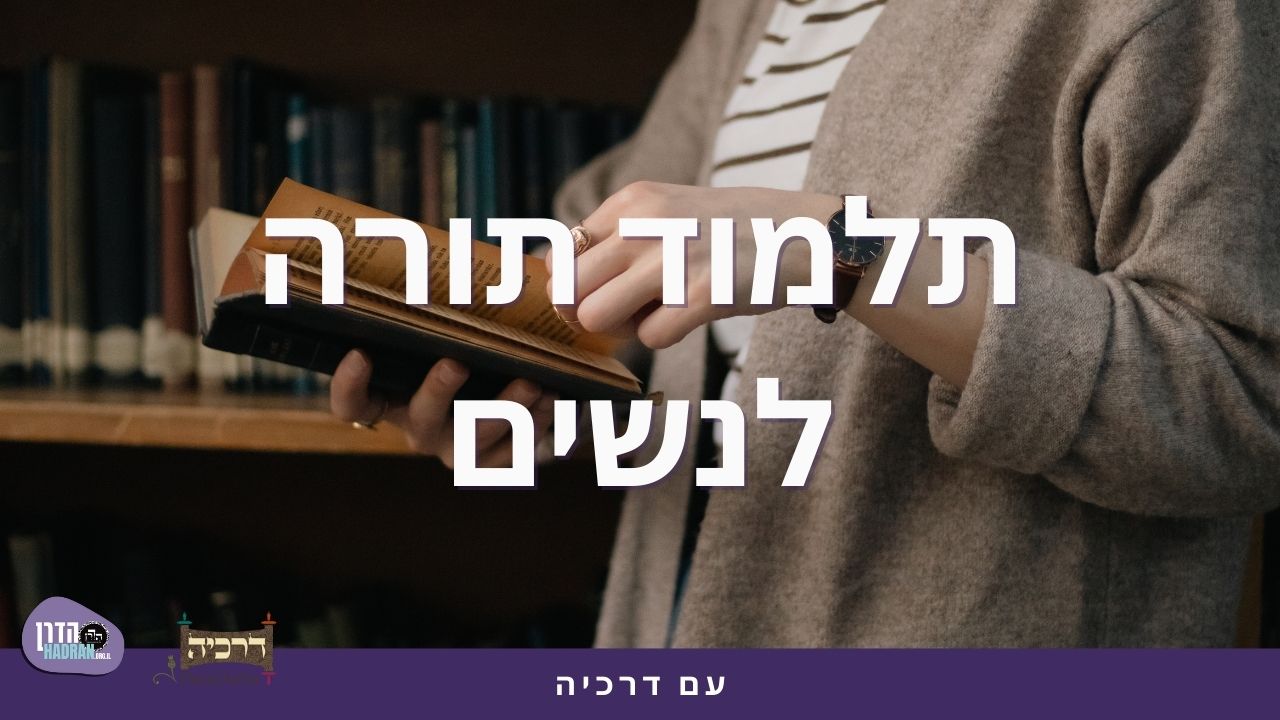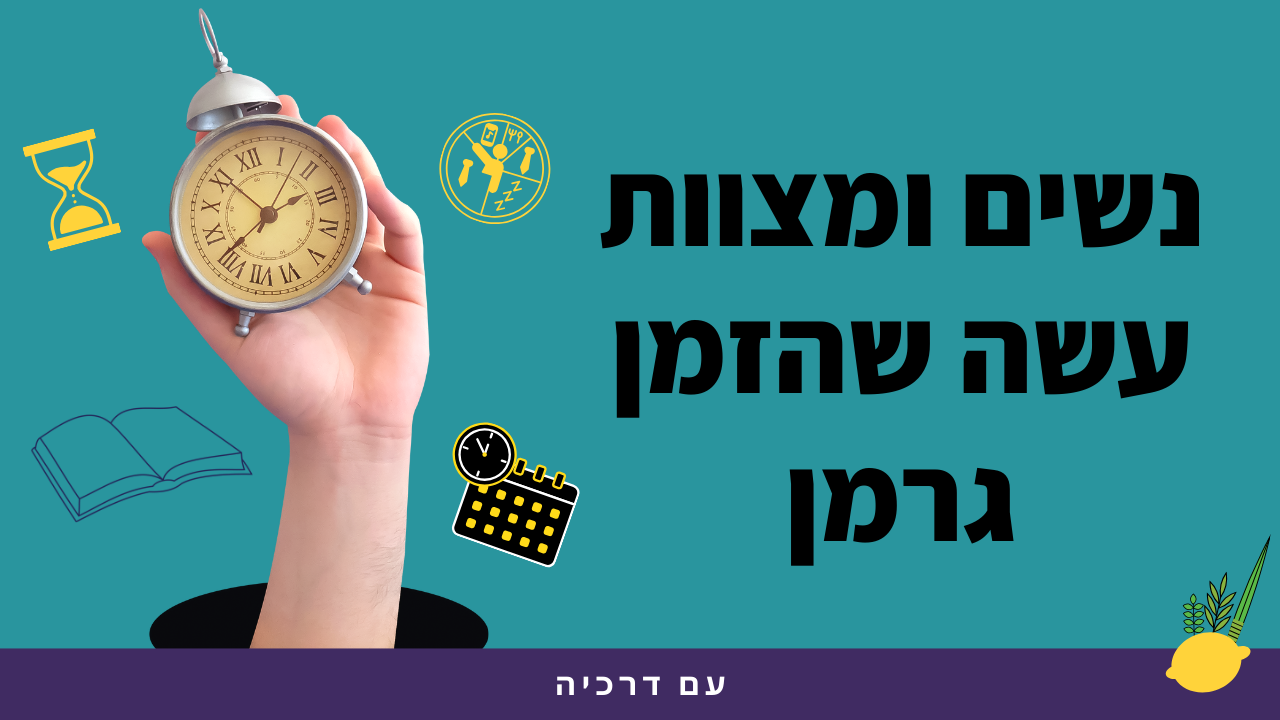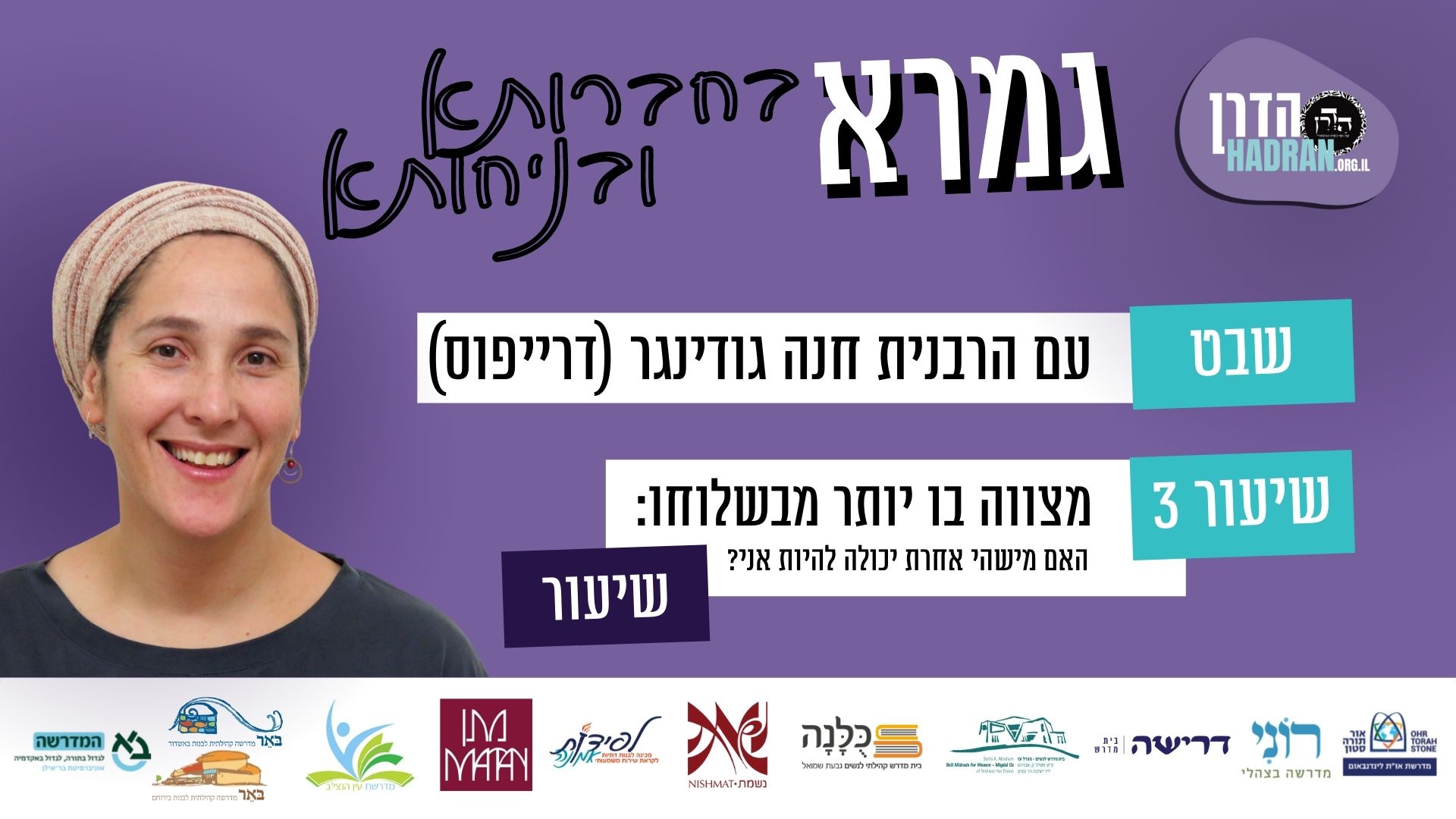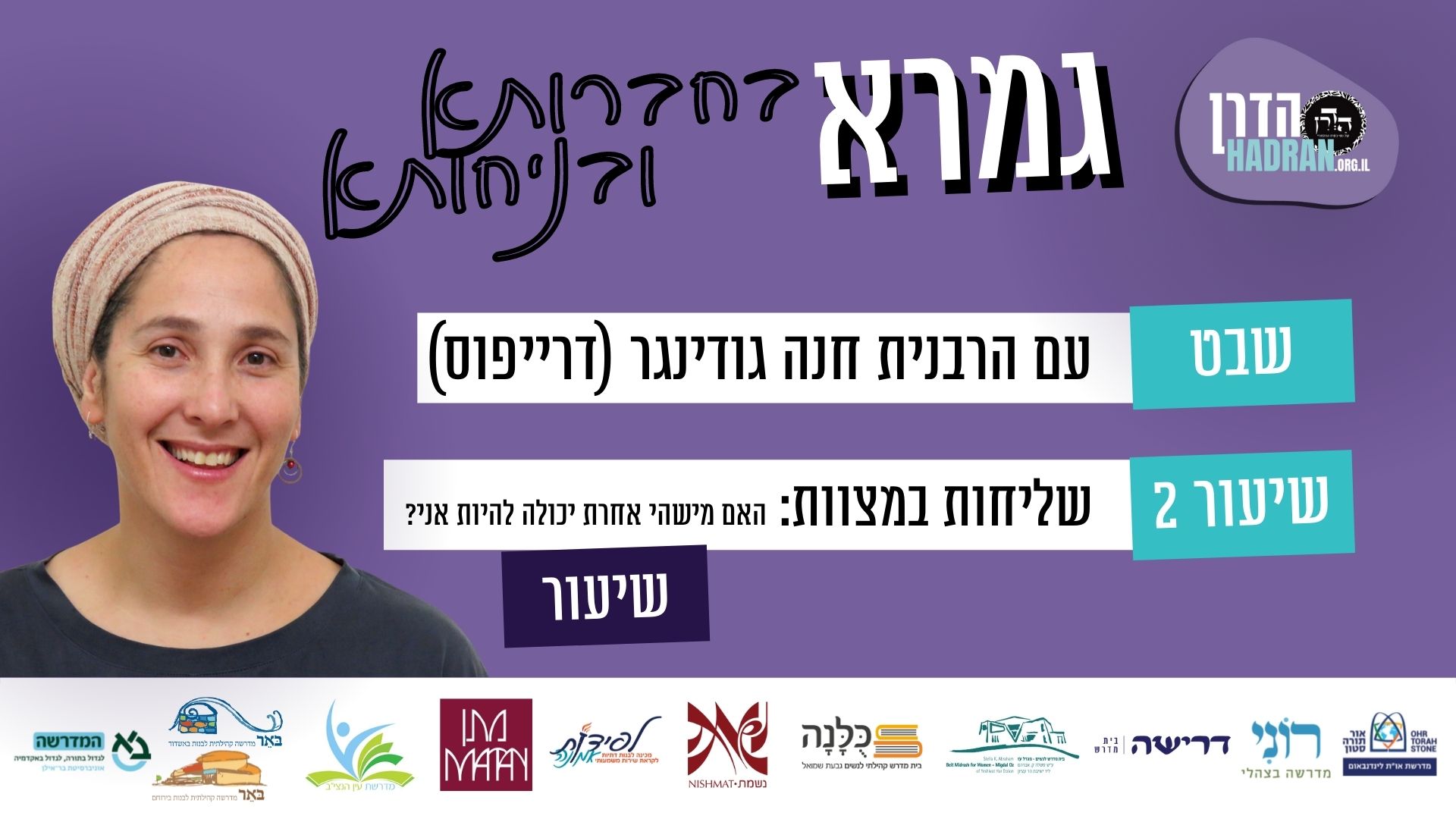הלימוד החודש מוקדש לרפואת פיליס הכט, גיטל פעשא בת מאשה רחל על ידי חברותיה הרבות שאוהבות ומעריכות אותה.
רוצה להקדיש שיעור?

כלים
הלימוד החודש מוקדש לרפואת פיליס הכט, גיטל פעשא בת מאשה רחל על ידי חברותיה הרבות שאוהבות ומעריכות אותה.
כלים
העמקה
רוצה להבין מה באמת קורה מתחת לפני השטח של הסוגיה?
שיעורים, פודקאסטים והרחבות של מיטב המורות שלנו יפתחו לך עוד זוויות וכיווני חשיבה.
חדשה בלימוד הגמרא?
זה הדף הראשון שלך? איזו התרגשות עצומה! יש לנו בדיוק את התכנים והכלים שיעזרו לך לעשות את הצעדים הראשונים ללמידה בקצב וברמה שלך, כך תוכלי להרגיש בנוח גם בתוך הסוגיות המורכבות ומאתגרות.
פסיפס הלומדות שלנו
גלי את קהילת הלומדות שלנו, מגוון נשים, רקעים וסיפורים. כולן חלק מתנועה ומסע מרגש ועוצמתי.
קידושין ד
יְצִיאָה דִּכְווֹתַהּ קָא מְמַעֵט.
it excludes a departure that is like it, i.e., a departure wherein the two masters are the potential recipients. Just as when no money is paid, the individual who might have received the payment is her master, so too, when money is paid, in a different set of circumstances, the money goes to the one who has authority over her, i.e., her father.
וְהָא לָא דָּמְיָא הַאי יְצִיאָה לְהַאי יְצִיאָה, הָתָם נָפְקָא לַהּ מֵרְשׁוּת אָדוֹן לִגְמָרֵי, וְהָכָא אַכַּתִּי מִיחַסְּרָא מְסִירָה לְחוּפָּה! בַּהֲפָרַת נְדָרִים מִיהָא נָפְקָא לַהּ מֵרְשׁוּתֵיהּ. דִּתְנַן: נַעֲרָה הַמְאוֹרָסָה אָבִיהָ וּבַעְלָהּ מְפִירִין נְדָרֶיהָ.
The Gemara asks: But this departure is not similar to that departure, as there, she leaves the authority of the master entirely upon being freed and she no longer retains any connection to him, and here, she still lacks the act of passing her over to the wedding canopy. Until she actually enters the wedding canopy, she has not left her father’s authority completely. The Gemara answers: Nevertheless, there is a similarity between her departures in both cases, as she leaves her father’s authority at least as far as the nullification of vows is concerned. As we learned in a mishna (Nedarim 66b): With regard to a betrothed young woman, her father and her husband together nullify her vows, and her father cannot nullify them alone.
וְהַאי ״וְיָצְאָה חִנָּם״ לְהָכִי הוּא דַּאֲתָא? הָא מִבְּעֵי לֵיהּ לְכִדְתַנְיָא, דְּתַנְיָא: ״וְיָצְאָה חִנָּם״ – אֵלּוּ יְמֵי בַּגְרוּת, ״אֵין כָּסֶף״ – אֵלּוּ יְמֵי נַעֲרוּת.
The Gemara asks: But does this verse: “Then shall she go out for nothing” (Exodus 21:11), come for that purpose, to teach that there is no money for this master, but there is money for a different master? But it is required for that which is taught in the following baraita. As it is taught in a baraita: The verse “Then shall she go out for nothing, without money” should be understood as follows: “Then shall she go out for nothing”; these words are referring to the days of adulthood, i.e., a Hebrew maidservant leaves her owner’s authority once she becomes an adult. “Without money [ein kasef]”; these words are referring to the days of her youth, i.e., when she becomes a young woman she leaves his authority.
אָמַר רָבִינָא: אִם כֵּן, לֵימָא קְרָא ״אֵן כָּסֶף״. מַאי ״אֵין כָּסֶף״ – אֵין כֶּסֶף לְאָדוֹן זֶה אֲבָל יֵשׁ כֶּסֶף לְאָדוֹן אַחֵר, וּמַאן נִיהוּ – אָב.
Ravina said: If so, that the verse is to be used only for this derivation, let the verse say: En kasef, without the letter yod. What is indicated by the full spelling with a yod: Ein kasef? This serves to teach the halakha stated above: There is no money for this master, but there is money for a different master. And who is he? He is her father, who has a right to receive the money when his daughter leaves his authority upon her betrothal.
וּמִמַּאי דְּדָרְשִׁינַן הָכִי – דְּתַנְיָא: ״וְזֶרַע אֵין לָהּ״
The Gemara explains: And from where is it derived that one interprets the verse homiletically in this manner? How is it known that the full form of the word ein teaches a halakha? As it is taught in a baraita with regard to the daughter of a priest who married a non-priest and was subsequently widowed or divorced: “And she has no child, and is returned to her father’s house, as in her youth, she may eat of her father’s bread” (Leviticus 22:13). This verse indicates that if she has no children from her non-priest husband she may once again partake of teruma.
– אֵין לִי אֶלָּא זַרְעָהּ. זֶרַע זַרְעָהּ מִנַּיִן? תַּלְמוּד לוֹמַר ״זֶרַע אֵין לָהּ״ – עַיֵּין לָהּ. וְאֵין לִי אֶלָּא זֶרַע כָּשֵׁר. זֶרַע פָּסוּל מִנַּיִן? תַּלְמוּד לוֹמַר ״זֶרַע אֵין לָהּ״ – עַיֵּין לָהּ.
I have derived only that this halakha applies to her actual children. From where do I derive that her children’s children are equivalent to children with regard to this halakha? The verse states: “She has no [ein lah] child,” where ein is spelled with a yod inserted in the middle. This additional letter serves to enable an alternative articulation of the term, specifically, one examines her [ayyein lah] to see if she has any descendants. And I have derived only that this halakha applies to children of unflawed lineage, i.e., her legitimate offspring. From where do I derive that children of flawed lineage, e.g., mamzerim, are also considered her children for the purposes of this halakha? The verse states: “She has no child,” which indicates that one examines her, as explained above.
וְהָא אַפֵּיקְתֵּיהּ לְזֶרַע זַרְעָהּ! זֶרַע זַרְעָהּ לָא אִיצְטְרִיךְ קְרָא, דִּבְנֵי בָנִים הֲרֵי הֵן כְּבָנִים. כִּי אִיצְטְרִיךְ קְרָא – לְזֶרַע פָּסוּל.
With regard to the last derivation, the Gemara asks: But you have already derived one halakha from this word, that her children’s children are considered like her children in this case. The Gemara answers: In fact, a verse was not necessary to teach about her children’s children, as there is an established principle that children’s children are considered like children. And therefore, when the verse was necessary, it was to teach the requirement of examining her for children of flawed lineage.
וְתַנָּא גּוּפֵיהּ מְנָלֵיהּ דְּדָרֵישׁ הָכִי? אָמְרִי: כְּתִיב ״מֵאֵן בִּלְעָם״ וּ״מֵאֵן יְבָמִי״, דְּלָא כְּתִיב בְּהוּ יוֹד. וְהָכָא, כְּתִיב בֵּיהּ יוֹד – שְׁמַע מִינַּהּ לִדְרָשָׁא הוּא דַּאֲתָא.
The Gemara asks: And the tanna himself, from where does he know that one can expound the yod in ein in this manner? The Gemara answers: They say in explanation that it is written: “Balaam refuses [me’en]” (Numbers 22:14), and it is similarly written: “My yavam refuses [me’en]” (Deuteronomy 25:7), and in neither case is a yod written. And here the word ein is written with a yod. Learn from it that the yod is superfluous and comes for the sake of an exposition.
וְאִיצְטְרִיךְ לְמִכְתַּב קִידּוּשֶׁיהָ לְאָבִיהָ, וְאִיצְטְרִיךְ לְמִכְתַּב מַעֲשֵׂה יָדֶיהָ לְאָבִיהָ. דְּאִי כְּתַב רַחֲמָנָא קִידּוּשֶׁיהָ לְאָבִיהָ, הֲוָה אָמֵינָא מִשּׁוּם דְּלָא טָרְחָא בְּהוּ, אֲבָל מַעֲשֵׂה יָדֶיהָ דְּקָא טָרְחָא בְּהוּ אֵימָא דִּידַהּ הָווּ.
The Gemara comments: And it was necessary to write a verse that teaches that her betrothal, i.e., the money or document of betrothal, belongs to her father, and it was necessary to write another verse that teaches that her earnings belong to her father, as one could not derive one halakha from the other. As, if the Merciful One had written only that her betrothal money belongs to her father, I would say that this is because she did not toil for it and therefore is not entitled to this sum. But with regard to her earnings, for which she toiled, say that they are hers. Therefore, it is necessary to state that her earnings also belong to her father.
וְאִי אַשְׁמְעִינַן מַעֲשֵׂה יָדֶיהָ, דְּקָא מִתַּזְנָא מִינֵּיהּ, אֲבָל קִידּוּשֶׁיהָ דְּמֵעָלְמָא קָאָתֵי לַהּ אֵימָא דִּידַהּ הָווּ, צְרִיכָא.
And conversely, if the verse had taught us only the halakha of her earnings, one would have said that they belong to her father because his daughter is sustained by him through his property. But with regard to her betrothal, i.e., the money or document of betrothal, which comes to her from an external source, I would say that it is hers. Therefore, it is necessary for the verse to teach both halakhot.
גּוּפָא: ״וְיָצְאָה חִנָּם״ – אֵלּוּ יְמֵי בַּגְרוּת, ״אֵין כֶּסֶף״ – אֵלּוּ יְמֵי נַעֲרוּת. וְלִכְתּוֹב רַחֲמָנָא נַעֲרוּת, וְלָא בָּעֵי בַּגְרוּת!
The Gemara returns to the matter itself: The baraita states with regard to a Hebrew maidservant: “Then shall she go out for nothing,” these are the days of adulthood; “without money,” these are the days of her youth. The Gemara asks: And let the Merciful One write that she leaves her master when she reaches her youth, and it would not be necessary to state that she leaves upon reaching adulthood. If she has already left her master when she becomes a young woman, it is not necessary to state that she leaves him upon reaching adulthood.
אָמַר רַבָּה: בָּא זֶה וְלִמֵּד עַל זֶה.
Rabba says: This phrase comes and teaches about that phrase. In other words, since it is not explicitly stated that this particular verse is referring to her departure when she becomes a young woman, if there was only one superfluous phrase one would conclude that it is referring to adulthood, as the halakha that she leaves the master when she becomes an adult is a lesser novelty. Therefore, two extraneous verses are required.
מִידֵּי דְּהָוֵה אַתּוֹשָׁב וְשָׂכִיר. דְּתַנְיָא: ״תּוֹשָׁב״ – זֶה קָנוּי קִנְיַן עוֹלָם, ״שָׂכִיר״ – זֶה קָנוּי קִנְיַן שָׁנִים.
Rabba cites an analogous case. This is just as it is with regard to a tenant and a hired worker. As it is taught in a baraita concerning teruma: The verse states: “A tenant of a priest or a hired worker shall not eat of the consecrated” (Leviticus 22:10). “A tenant”; this is referring to a Hebrew slave who has been acquired as a permanent acquisition, i.e., one who said he wishes to stay with his master. This Hebrew slave has his ear pierced and he remains with his master until the Jubilee Year. “A hired worker”; this is referring to a Hebrew slave who has been acquired for an acquisition of six years, the standard period of servitude for a Hebrew slave.
יֵאָמֵר ״תּוֹשָׁב״ וְלֹא יֵאָמֵר ״שָׂכִיר״, וַאֲנִי אוֹמֵר: קָנוּי קִנְיַן עוֹלָם אֵינוֹ אוֹכֵל, קָנוּי קִנְיַן שָׁנִים לֹא כׇּל שֶׁכֵּן?
The baraita asks: Let the verse say “tenant” and let it not say “hired worker,” and I would say: If one who is acquired as a permanent acquisition does not partake of his owner’s, i.e., the priest’s, teruma, as despite his status as a Hebrew slave he is not considered his owner’s property, is it not all the more so that one who is acquired for an acquisition of six years should not be permitted to partake of teruma?
אִילּוּ כֵּן, הָיִיתִי אוֹמֵר: ״תּוֹשָׁב״ – זֶה קָנוּי קִנְיַן שָׁנִים. אֲבָל קְנוּי קִנְיַן עוֹלָם – אוֹכֵל. בָּא ״שָׂכִיר״ וְלִימֵּד עַל ״תּוֹשָׁב״, שֶׁאַף עַל פִּי שֶׁקָּנוּי קִנְיַן עוֹלָם – אֵינוֹ אוֹכֵל.
The baraita answers: If so, that the verse were stated in this manner, I would say: “A tenant”; this is one who was acquired for an acquisition of six years, as the term itself is ambiguous. But one who was acquired as a permanent acquisition may partake of teruma. Therefore, the term “hired worker,” which is certainly referring to one who is less permanent than a tenant, comes and teaches about the meaning of the term “tenant,” that even if a Hebrew slave was acquired as a permanent acquisition he may not partake of teruma. A similar line of reasoning applies in the above case of a young woman and an adult.
אֲמַר לֵיהּ אַבָּיֵי: מִי דָּמֵי? הָתָם תְּרֵי גוּפֵי נִינְהוּ, דְּכִי נָמֵי כְּתַב רַחֲמָנָא ״תּוֹשָׁב נִרְצָע לֹא יֹאכַל״ וַהֲדַר כְּתַב אִידַּךְ, הֲוָה שָׂכִיר מִילְּתָא דְּאָתְיָא בְּקַל וָחוֹמֶר, וּמִילְּתָא דְּאָתְיָא בְּקַל וָחוֹמֶר טָרַח וְכָתַב לַהּ קְרָא.
Abaye said to Rabba: Are these cases really comparable? There, the tenant and the hired worker are two bodies. This is significant, as even if the Merciful One had written explicitly that a pierced tenant may not partake of teruma, from which the halakha of a Hebrew slave for six years could have been inferred, and then the Merciful One wrote the other case of a Hebrew slave acquired temporarily, this would not present a serious difficulty. The reason is that, although the halakha of a hired worker is a matter that could be derived by means of an a fortiori inference, and therefore it does not have to be stated explicitly, there is a principle: Sometimes with regard to a matter that can be derived through an a fortiori inference, the verse nevertheless takes the trouble and writes it explicitly.
אֶלָּא הָכָא, חַד גּוּפָא הִיא – כִּי נָפְקָא לַהּ בְּנַעֲרוּת, בַּגְרוּת מַאי בָּעֲיָא גַּבֵּיהּ?
But here, with regard to a woman, she is one body, i.e., it is the same Hebrew maidservant. Once she has left upon the arrival of her youth, what is she doing in his authority as an adult? It is entirely unnecessary for the verse to teach that she leaves her master upon becoming an adult, as she has already left him.
אֶלָּא אָמַר אַבָּיֵי: לֹא נִצְרְכָה אֶלָּא לְבֶגֶר דְּאַיְלוֹנִית,
Rather, Abaye rejects the previous suggestion that one verse teaches about the other, and said: The claim that the verse “Then shall she go out for nothing” is referring to adulthood is necessary only for the adulthood of a sexually underdeveloped woman who is incapable of bearing children [ailonit]. An ailonit will never develop the physical signs of maturity, i.e., two pubic hairs. Consequently, she does not go through the halakhic stage of a young woman. Instead, she remains a minor until the age of twenty, at which point she immediately becomes an adult.
סָלְקָא דַּעְתָּךְ אָמֵינָא: בְּנַעֲרוּת תִּיפּוֹק, בְּבַגְרוּת לָא תִּיפּוֹק, קָא מַשְׁמַע לַן.
Consequently, if the Torah did not teach that a Hebrew maidservant leaves her master upon becoming an adult, it might enter your mind to say: She leaves only when entering her youth, but when entering adulthood directly she does not leave. Since an ailonit is never classified as a young woman, she would never leave servitude. Therefore, the verse teaches us that a Hebrew maidservant leaves her master even if she reaches adulthood directly.
מַתְקֵיף לַהּ מָר בַּר רַב אָשֵׁי: וְלָאו קַל וָחוֹמֶר הוּא? וּמָה סִימָנִין שֶׁאֵין מוֹצִיאִין מֵרְשׁוּת אָב – מוֹצִיאִין מֵרְשׁוּת אָדוֹן, בַּגְרוּת שֶׁמּוֹצִיאָה מֵרְשׁוּת אָב – אֵינוֹ דִּין שֶׁמּוֹצִיאָה מֵרְשׁוּת אָדוֹן?
Mar bar Rav Ashi objects to this: But is it not an a fortiori inference? And if the signs indicating that a young woman has entered puberty do not fully release a young woman from her father’s authority, as he can still betroth her, nevertheless, they do release her from the master’s authority; is it not logical that adulthood, which completely releases her from her father’s authority, should release her from the master’s authority? If so, one can derive by this reasoning that an ailonit leaves her master in adulthood, which means the verse is unnecessary.
אֶלָּא אָמַר מָר בַּר רַב אָשֵׁי: לֹא נִצְרְכָה אֶלָּא לְעִיקַּר זְבִינָא דְאַיְלוֹנִית, סָלְקָא דַּעְתָּךְ אָמֵינָא: דְּאַתְיָא סִימָנֵי נַעֲרוּת – הָוֵי זְבִינָא, דְּלָא אַתְיָא סִימָנֵי נַעֲרוּת – לָא הָוֵי זְבִינַהּ זְבִינָא,
Rather, Mar bar Rav Ashi says: This verse is necessary only with regard to the basic halakha of the sale of an ailonit as a Hebrew maidservant. As it might enter your mind to say that if a female will show the signs of a young woman, i.e., puberty, her sale is a valid sale, whereas in a case where she will not show the signs of a young woman, her sale is not a valid sale. The reason one might think this is the case is that if the maidservant turns out to be an ailonit, one cannot fulfill the requirements of the verse, as she will never become a young woman.
קָא מַשְׁמַע לַן ״וְיָצְאָה חִנָּם כּוּ׳״.
Therefore the superfluous phrase: “Then shall she go out for nothing, without money” (Exodus 21:11), teaches us that even an ailonit can be sold as a Hebrew maidservant and is released upon reaching adulthood.
וּלְמָר בַּר רַב אָשֵׁי, דְּאָמַר: וְלָאו קַל וָחוֹמֶר הוּא, הָא אָמְרִינַן מִילְּתָא דְּאָתְיָא בְּקַל וָחוֹמֶר טָרַח וְכָתַב לַהּ קְרָא! הָנֵי מִילֵּי הֵיכָא דְּלֵיכָּא לְשַׁנּוֹיֵי, אֲבָל הֵיכָא דְּאִיכָּא לְשַׁנּוֹיֵי – מְשַׁנִּינַן.
The Gemara asks: And according to the opinion of Mar bar Rav Ashi, who said: But is it not an a fortiori inference that adulthood releases a woman from her master’s authority, how does he respond to the fact that we say in general, with regard to a matter that can be derived through an a fortiori inference, the verse nevertheless takes the trouble and writes it explicitly? The Gemara answers: That matter applies only where there is no other way to resolve the difficulty of why a halakha is written when it could be derived through an a fortiori inference. But when there is another, more substantial way to resolve the difficulty, one resolves it in that manner.
וְתַנָּא מַיְיתֵי לַהּ מֵהָכָא, דְּתַנְיָא: ״כִּי יִקַּח אִישׁ אִשָּׁה וּבְעָלָהּ וְהָיָה אִם לֹא תִמְצָא חֵן בְּעֵינָיו כִּי מָצָא בָהּ וְגוֹ׳״ – אֵין קִיחָה אֶלָּא בְּכֶסֶף. וְכֵן הוּא אוֹמֵר: ״נָתַתִּי כֶּסֶף הַשָּׂדֶה קַח מִמֶּנִּי״.
§ The Gemara notes: And a tanna cites the halakha that a woman can be betrothed with money from here, a different source. As it is taught in a baraita that when the verse states: “When a man takes a woman and engages in sexual intercourse with her, and it comes to pass, if she finds no favor in his eyes, because he has found some unseemly matter in her, and he writes her a scroll of severance” (Deuteronomy 24:1), in this verse, the term taking is only with money. And so it says: “I will give money for the field; take it from me” (Genesis 23:13).
וַהֲלֹא דִּין הוּא: וּמָה אָמָה הָעִבְרִיָּה שֶׁאֵינָהּ נִקְנֵית בְּבִיאָה – נִקְנֵית בְּכֶסֶף, זוֹ, שֶׁנִּקְנֵית בְּבִיאָה – אֵינוֹ דִּין שֶׁתִּקָּנֶה בְּכֶסֶף?
The Gemara asks: But is there any need for this derivation? Could this not be derived through an a fortiori inference, as follows: And if a Hebrew maidservant, who cannot be acquired as a maidservant through intercourse, nevertheless can be acquired through money, is it not logical that this woman, who can be acquired through intercourse for the purpose of betrothal, can likewise be acquired through money?
יְבָמָה תּוֹכִיחַ, שֶׁנִּקְנֵית בְּבִיאָה וְאֵינָהּ נִקְנֵית בְּכֶסֶף! מָה לִיבָמָה, שֶׁכֵּן אֵין נִקְנֵית בִּשְׁטָר, תֹּאמַר בְּזוֹ, שֶׁנִּקְנֵית בִּשְׁטָר!
Nevertheless, this a fortiori inference can be refuted. A yevama proves otherwise, as she is acquired by the yavam through intercourse, and yet she cannot be acquired through money. The Gemara rejects this refutation: What is unique about a yevama is that she cannot be acquired through a document. Will you say that the same applies to this woman, who can be acquired through a document for the purpose of betrothal, and consequently the acquisition of money applies to her as well?
תַּלְמוּד לוֹמַר: ״כִּי יִקַּח אִישׁ״. הָא לְמָה לִי קְרָא, הָא אָתְיָא לַהּ! אָמַר רַב אָשֵׁי: מִשּׁוּם דְּאִיכָּא לְמֵימַר מֵעִיקָּרָא דְּדִינָא פִּירְכָא.
The Gemara reiterates its question. The verse states: “When a man takes a woman.” Why do I need a verse for this purpose? It was already derived through this a fortiori inference, as the proposed refutation of this inference was rejected. Rav Ashi said: It is needed because one can say that the refutation of the a fortiori inference is present from the outset, i.e., there is a difficulty with the comparison between a woman and a Hebrew maidservant.
מֵהֵיכָא קָא מַיְיתֵית לַהּ – מֵאָמָה הָעִבְרִיָּה. מָה לְאָמָה הָעִבְרִיָּה, שֶׁכֵּן יוֹצְאָה בְּכֶסֶף, תֹּאמַר בְּזוֹ, שֶׁאֵינָהּ יוֹצְאָה בְּכֶסֶף. תַּלְמוּד לוֹמַר ״כִּי יִקַּח אִישׁ״.
Rav Ashi elaborates: From where do you derive that a woman can be betrothed with money? It is derived through an a fortiori inference from the case of a Hebrew maidservant. This derivation can be refuted. What is unique about a Hebrew maidservant is that she can be released with money, i.e., she pays her master her value as a maidservant and she is then freed, and therefore she can likewise be acquired through money. Will you say the same with regard to this woman, who cannot be released, i.e., divorced, through money? Since this a fortiori inference is rejected, one must rely on the source cited in the baraita, that the verse states: “When a man takes.”
וְאִיצְטְרִיךְ לְמִיכְתַּב ״וְיָצְאָה חִנָּם״, וְאִיצְטְרִיךְ לְמִיכְתַּב ״כִּי יִקַּח אִישׁ״. דְּאִי כְּתַב רַחֲמָנָא ״כִּי יִקַּח״, הֲוָה אָמֵינָא: קִידּוּשִׁין דִּיהַב לַהּ בַּעַל – דִּידַהּ הָווּ, כְּתַב רַחֲמָנָא ״וְיָצְאָה חִנָּם״.
After mentioning an additional proof for the option of betrothal with money, the Gemara comments: And it was necessary for the Torah to write, with regard to a Hebrew maidservant: “Then shall she go out for nothing,” and it was also necessary to write: “When a man takes a woman.” As, if the Merciful One had written only: “When he takes,” I would say: The betrothal money that the husband gives her is invariably hers. Therefore, the Merciful One writes: “Then shall she go out for nothing,” to teach that when she is not an adult her father has the right to her betrothal money.
וְאִי כְּתַב רַחֲמָנָא ״וְיָצְאָה חִנָּם״, הֲוָה אָמֵינָא: הֵיכָא דְּיָהֲבָה לֵיהּ אִיהִי לְדִידֵיהּ וְקִידְּשַׁתּוּ – הָווּ קִידּוּשֵׁי, כְּתַב רַחֲמָנָא ״כִּי יִקַּח״ – וְלָא ״כִּי תִּקַּח״.
And conversely, had the Merciful One written only: “Then shall she go out for nothing,” I would say that in a case where she gave him money and betrothed him, it is a valid betrothal, as this verse does not specify who gives the money to whom. Therefore, the Merciful One writes: “When he takes,” and not: When she takes, to teach that only a man may betroth a woman, not vice versa.
״וּבְעָלָהּ״ – מְלַמֵּד שֶׁנִּקְנֵית בְּבִיאָה. וַהֲלֹא דִּין הוּא: וּמָה יְבָמָה שֶׁאֵין נִקְנֵית בְּכֶסֶף – נִקְנֵית בְּבִיאָה, זוֹ, שֶׁנִּקְנֵית בְּכֶסֶף – אֵינוֹ דִּין שֶׁנִּקְנֵית בְּבִיאָה?
The baraita continues to interpret the verse. The phrase: “And engages in sexual intercourse with her” (Deuteronomy 24:1), teaches that a woman can be acquired through intercourse. Why is it necessary for the verse to state this explicitly? Could this not be derived through an a fortiori inference: And if a yevama, who cannot be acquired through money, can be acquired through intercourse, is it not logical that this woman, who can be acquired through money, as derived above, can also be acquired through intercourse?
אָמָה הָעִבְרִיָּה תּוֹכִיחַ, שֶׁנִּקְנֵית בְּכֶסֶף וְאֵין נִקְנֵית בְּבִיאָה. מָה לְאָמָה הָעִבְרִיָּה, שֶׁאֵין קִנְיָנָהּ לְשׁוּם אִישׁוּת, תֹּאמַר בְּזוֹ, שֶׁקִּנְיָנָהּ לְשׁוּם אִישׁוּת.
The Gemara counters: The case of a Hebrew maidservant proves otherwise, as she is acquired through money and yet she cannot be acquired through intercourse. The Gemara dismisses this refutation: What is distinct about a Hebrew maidservant is that her acquisition is not for the sake of marriage, as she is acquired as a servant. Will you say the same with regard to this woman, whose acquisition is for the sake of marriage? Therefore, it is logical that a woman can be acquired through sexual intercourse.
תַּלְמוּד לוֹמַר: ״וּבְעָלָהּ״. וּלְמָה לִי קְרָא, הָא אָתְיָא לַהּ! אָמַר רַב אָשֵׁי: מִשּׁוּם דְּאִיכָּא לְמֵימַר מֵעִיקָּרָא דְּדִינָא פִּירְכָא: מֵהֵיכָא קָא מַיְיתֵית לַהּ – מִיְּבָמָה.
The Gemara reiterates its question. The verse states: “And engages in sexual intercourse with her.” But why do I need a verse for this purpose? It was already derived through the above a fortiori inference. Rav Ashi said: It is needed because it is possible to say that the refutation of the a fortiori inference is present from the outset. From where do you derive that intercourse is a mode of acquisition? From the case of a yevama.
מָה לִיבָמָה, שֶׁכֵּן זְקוּקָה וְעוֹמֶדֶת, תֹּאמַר בָּזוֹ, שֶׁאֵין זְקוּקָה וְעוֹמֶדֶת. תַּלְמוּד לוֹמַר: ״וּבְעָלָהּ״.
One could say: What is unique about a yevama is that she is bound to the yavam and stands waiting for him to act, and for this reason sexual intercourse is sufficient to render her his wife. Will you say the same with regard to this woman, who is not bound and is not standing waiting for anyone? It is therefore possible that intercourse is not enough to acquire a woman in ordinary circumstances. Consequently, the a fortiori inference does not bear close scrutiny. For this reason an additional proof is required, that the verse states: “And engages in sexual intercourse with her.”
